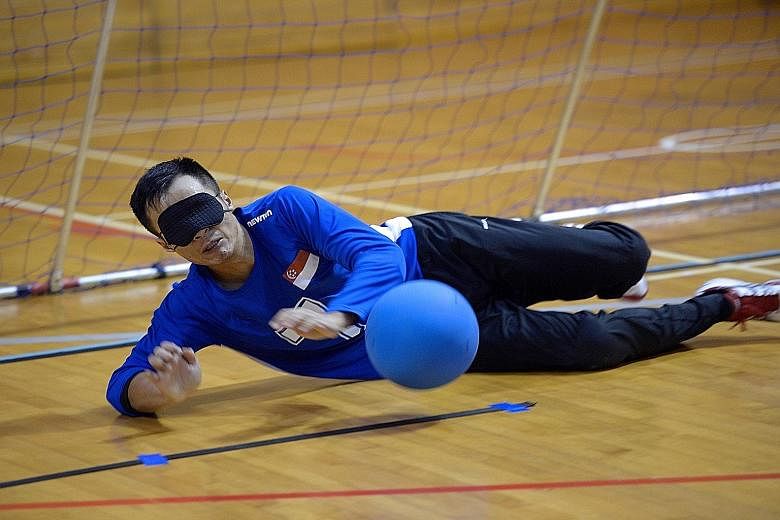It is the most widely-played sport by blind people, but until this year, Singapore did not have a national goalball team, even though it is the first Paralympic sport designed for the visually impaired.
And during the process of recruitment for the Republic's fledgling team, one familiar face stood out among the pioneer members of the team.
Kelvin Tan became a household name in 2005 when he became the first winner of Project Superstar, the local reality television singing competition.
Born blind as a result of a condition known as Leber's congenital amaurosis, his trail-blazing instincts that first surfaced during the TV series remained strong as he prepared to participate in the APG, which begins on Thursday.
-
GOALBALL
-
GOLD MEDALS ON OFFER: 2
TEAM SINGAPORE:
Men: Marc Chiang, Ong Hock Bee, Kelvin Tan, Muhammad Hidayat, Nazarudin Razak.
Women: Grace Ng, Nurul Natasya Idrus, Emily Lee, Norliana Mohamed Ajam, Joan Hung
LAST APG: Thailand won both golds last year. Singapore will make their debut this year.
ABOUT THE SPORT
• The game is played in teams of three with two halves of 12 minutes each.
• All players wear protective eye masks to ensure fairness.
• The players take it in turns to score by rolling a ball, with bells inside, into the opponents' goal.
• The bells also guide defenders, who lie on their sides to form a "wall" to block shots. The game has to be played in silence, and the crowd can cheer only when a goal is scored.
• Players use line markings on the court and the goalpost to orientate themselves and get into throwing and blocking positions.
CLASSIFICATION: All players must have a visual impairment.
Tan was part of a group comprising five men and a woman who began training in January. But just three men - Tan, Ong Hock Bee and Nazarudin Razak - stayed on as the others dropped out.
Nonetheless, the squad continued to grow gradually. And Tan played his part as he invited Muhammad Hidayat and Joan Hung to join the team. Tan met them at his workplace at Dialogue in the Dark, a social enterprise that allows the public to experience what it is like to be blind, where he works as a guide.
Now, about 20 years after the game took off in South-east Asia, Singapore has its first national men's and women's squads for the Asean Para Games (APG).
Said the 34-year-old, who has played the sport for recreation since he was a teenager: "Almost every country had a national goalball team except us. So when I was asked to make a competitive switch in January, I took up the challenge."
The players faced a steep learning curve as they were drilled in basic skills such as ball handling, throwing, blocking and reacting fast to opponents' throws.
Tan said: "I was born blind, I've never seen a person throw a ball before. Our coach can't demonstrate it for us, so he must convey instructions through words and actions."
These challenges are accompanied by a cocktail of abrasions, bruises, scratches, body and muscle aches as a result of diving incessantly across the wooden court.
Said national head coach Hansen Bay, 39: "They have to be on the floor all the time. They have to slide and dive left and right. It can be rather painful for them and physically demanding."
While the national team are still finding their feet, regional powerhouses like Thailand - who won both gold medals at last year's APG - and Malaysia are already well established in the sport.
Nevertheless, Tan feels responsible about blooding younger talent. He said with a laugh: "I'm the second youngest member of the team, yet I'm already 34. The oldest player of a Malaysian state team is 37.
"We're the pioneer team in Singapore, but we are not young, so we are unlikely to be the best team at the APG."
The current Singapore men's and women's teams have an average age of 36 and 34 respectively, while most of their opponents are in the early 20s.
Tan feels that the sport is far more exciting than swimming or running, even though he still joins Runninghour, a running support group for those with special needs.
He said: "Running is boring for a blind person. I'm unable to enjoy the scenery, the views or even pretty girls. It's like running on a treadmill for me, as the only enjoyment is to complete it."
He is reluctantabout putting on a Team Singapore jersey again for the next APG.
He explained: "I've been in the limelight before, and I don't crave it. If I had the choice, I would play purely for leisure instead.
"This could be the first and last time I'll compete in the APG, and I'll be happy to leave. I hope that (by the next APG), goalball will not need me."

